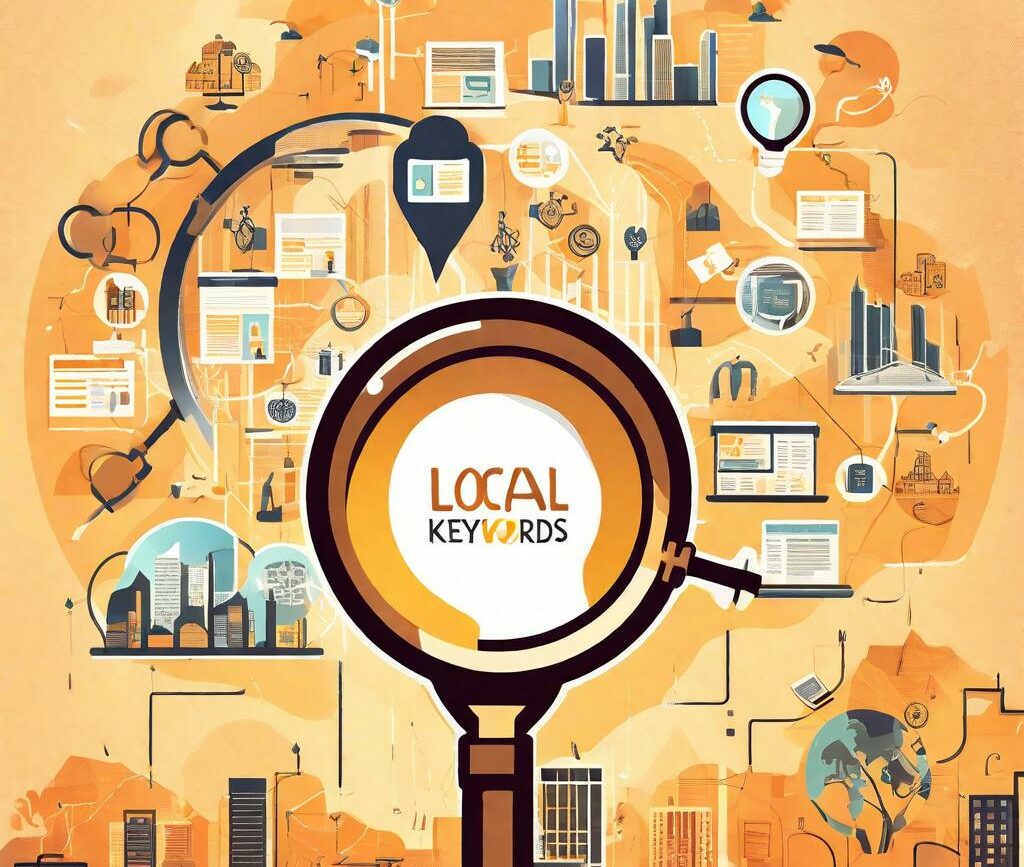When it comes to estate agencies, local search engine optimization (SEO) plays a crucial role in reaching potential clients in their target market. Understanding the importance of local SEO is essential for estate agencies looking to maximize their online presence and boost their business. One powerful tool in the arsenal of local SEO is the use of long-tail keywords. These highly specific keyword phrases allow estate agencies to target their audience more effectively and increase their chances of appearing in local search results.
B. Defining Long-Tail Keywords and Their Significance
Long-tail keywords are keyword phrases that are more specific and longer in length compared to generic or broad keywords. For example, instead of targeting the keyword “estate agency,” a long-tail keyword could be “luxury estate agency in London.” By incorporating long-tail keywords into their SEO strategy, estate agencies can improve their visibility in search results and attract highly targeted traffic.
C. Benefits of Targeting Long-Tail Keywords for Estate Agencies
The benefits of targeting long-tail keywords for estate agencies are numerous. Firstly, long-tail keywords have less competition compared to generic keywords, making it easier for estate agencies to rank higher in search engine results. Additionally, long-tail keywords allow estate agencies to reach a more targeted audience, increasing the conversion rates and ultimately driving more business. Finally, long-tail keywords provide valuable insights into the specific needs and preferences of potential clients, enabling estate agencies to tailor their offerings and services more effectively.
Conducting Thorough Keyword Research for Local SEO

To leverage the power of long-tail keywords, estate agencies must conduct thorough keyword research. This research involves analyzing localized search intent and user behaviors to identify relevant and effective long-tail keywords. There are several key steps and considerations to keep in mind during this process.
A. Identifying Localized Search Intent and User Behaviors
1. Analyzing Specific Local Queries and User Intent
Understanding the specific intent behind localized search queries is crucial for estate agencies. By analyzing specific local queries and user intent, estate agencies can uncover valuable insights into the needs and preferences of potential clients. For example, if a user searches for “estate agency in [city name],” their intent is to find an agency in that specific location. By targeting location-specific queries, estate agencies can align their keywords with user intent, increasing the chances of appearing in relevant search results.
2. Examining Common Search Patterns in the Real Estate Industry
Additionally, examining common search patterns in the real estate industry can provide further guidance for keyword research. For instance, users often search for specific property types or features, such as “2-bedroom apartment with a balcony.” By incorporating these elements into long-tail keywords, estate agencies can attract highly relevant traffic.
3. Leveraging Tools for Keyword Research and Analysis
To simplify and enhance the keyword research process, estate agencies should leverage tools specifically designed for keyword research and analysis. These tools can provide valuable insights into search volume, competition, and related keywords, helping estate agencies identify the most effective long-tail keywords for their local SEO efforts.
B. Selecting Relevant Long-Tail Keywords for Estate Agencies
1. Focusing on Location-Specific Queries
Once estate agencies have a better understanding of localized search intent and user behaviors, they can start selecting relevant long-tail keywords. Focusing on location-specific queries is essential to target a specific market effectively. For example, if an estate agency is located in London, they can incorporate long-tail keywords such as “luxury estate agency in London” or “property investment in London.”
2. Incorporating Property Types and Features in Keywords
Incorporating property types and features into long-tail keywords is another effective strategy. By considering the specific needs and preferences of potential clients, estate agencies can create highly targeted keywords. For instance, “3-bedroom house with a garden in [neighborhood name]” or “beachfront villa for sale in [destination name]” are examples of long-tail keywords that can attract users looking for specific property types and features.
3. Utilizing Long-Tail Keywords for Different Stages of the Buying/Selling Process
Furthermore, estate agencies should utilize long-tail keywords that align with different stages of the buying/selling process. For example, targeting keywords related to “researching properties in [location name]” or “finding a real estate agent in [city name]” can capture users at the early stages of the process, while keywords such as “best estate agency for selling a house in [neighborhood name]” can attract users who are ready to make a transaction.
C. Analyzing Competitor Keywords to Gain a Competitive Edge
Analyzing competitor keywords can provide valuable insights and opportunities for estate agencies. By identifying competitor keywords in local SEO, estate agencies can understand the strategies employed by their competitors and differentiate their own keyword approach.
1. Identifying Competitor Keywords in Local SEO
Identifying competitor keywords can be done through competitor analysis tools or by manually examining the keywords used in their website content and metadata. Estate agencies can gain insights into the specific keywords that their competitors are targeting and evaluate their effectiveness in capturing the local market.
2. Assessing Competitor Ranking Strategies and Opportunities
In addition to identifying competitor keywords, estate agencies should assess the ranking strategies and opportunities utilized by their competitors. This analysis involves examining the backlink profiles of competitors, the content they produce, and how they optimize their on-page elements. By understanding the strengths and weaknesses of their competitors’ SEO strategies, estate agencies can refine their own approach and gain a competitive edge.
Crafting Effective Content Optimized for Long-Tail Keywords
 Once estate agencies have identified their target long-tail keywords, the next step is to craft high-quality, valuable content that is optimized for SEO. Creating content that resonates with the target audience and aligns with user intent is crucial for effective local SEO.
Once estate agencies have identified their target long-tail keywords, the next step is to craft high-quality, valuable content that is optimized for SEO. Creating content that resonates with the target audience and aligns with user intent is crucial for effective local SEO.
A. Creating High-Quality, Valuable Content for Local SEO
1. Understanding User Intent to Provide Relevant Content
To provide relevant content that addresses user intent, estate agencies must first understand the needs and preferences of their target audience. By conducting thorough market research and analyzing user behaviors, estate agencies can gain insights into the specific topics and information that potential clients are searching for.
2. Utilizing Keywords Naturally and Strategically
Utilizing keywords naturally and strategically is essential for effective content optimization. Estate agencies should incorporate their target long-tail keywords in a way that feels organic and seamless. Keyword stuffing or overusing keywords can result in a poor user experience and can even lead to penalties from search engines. Instead, estate agencies should focus on creating valuable content that offers unique insights and addresses the needs of their audience while naturally incorporating their long-tail keywords.
3. Including Localized Information and Unique Selling Points
Including localized information and unique selling points in the content is another effective strategy for estate agencies. By showcasing their expertise in a specific location or highlighting unique features of their services, estate agencies can differentiate themselves from competitors and attract local clients who are searching for specialized knowledge or unique offerings.
B. Optimizing On-Page Elements for Local SEO Success
In addition to crafting high-quality content, optimizing on-page elements is crucial for local SEO success. By strategically incorporating long-tail keywords into various on-page elements, estate agencies can increase their visibility in search results and improve the overall user experience.
1. Enhancing Meta Titles and Descriptions with Long-Tail Keywords
Enhancing meta titles and descriptions with long-tail keywords is an effective way to capture the attention of potential clients. By including relevant long-tail keywords in these elements, estate agencies can improve their click-through rates and attract users who are specifically looking for their services.
2. Incorporating Keywords in Heading Tags for Improved Readability
Incorporating keywords in heading tags (H1, H2, H3) not only improves the readability of the content but also signals to search engines the relevancy of the content to a particular topic. Estate agencies should strategically place their long-tail keywords in heading tags to optimize their content for search engines while providing a clear and organized structure for users.
3. Optimizing URLs, Image Alt Text, and Internal Linking Structure
Optimizing URLs, image alt text, and internal linking structure is equally important. Including long-tail keywords in URLs, alt tags for images, and anchor texts for internal links helps search engines understand the context of the content and improves the overall SEO performance.
C. Incorporating Long-Tail Keywords in Off-Page SEO Tactics
Off-page SEO tactics complement on-page optimization efforts and play a crucial role in boosting the local SEO performance of estate agencies. Incorporating long-tail keywords in off-page SEO tactics further enhances the visibility and relevance of estate agencies in their target market.
1. Leveraging Local Directories, Listings, and Citations
Leveraging local directories, listings, and citations is a powerful off-page SEO strategy. By accurately listing their estate agency in local directories and ensuring consistent and up-to-date information, estate agencies can improve their local SEO performance and increase their chances of appearing in localized search results.
2. Building Quality Backlinks with Long-Tail Anchor Texts
Building quality backlinks with long-tail anchor texts is another effective tactic. By obtaining backlinks from reputable websites or industry-related blogs, estate agencies can improve their domain authority and increase their chances of ranking higher in search engine results. Incorporating long-tail keywords as anchor texts in these backlinks further contributes to the relevance and visibility of estate agencies.
3. Engaging in Community Outreach to Promote Local SEO
Engaging in community outreach to promote local SEO is a strategy that allows estate agencies to build strong relationships within their local market. By participating in local events, sponsoring community initiatives, or collaborating with other local businesses, estate agencies can enhance their online presence and increase their chances of appearing in search results for targeted long-tail keywords.
Monitoring and Adjusting Local SEO Efforts with Long-Tail Keywords

Once estate agencies have implemented their local SEO strategies, monitoring and adjusting their efforts is essential for continuous improvement and optimal results.
A. Tracking Keyword Rankings and Organic Traffic Performance
1. Using Reliable SEO Tools to Monitor Rankings
Using reliable SEO tools to monitor rankings is crucial for estate agencies. By consistently tracking their keyword rankings, estate agencies can gauge the effectiveness of their SEO efforts and identify areas for improvement. This data helps estate agencies understand which long-tail keywords are performing well and which keywords may require further optimization.
2. Analyzing Organic Traffic Patterns and User Behavior
Analyzing organic traffic patterns and user behavior is equally important. By examining the sources of organic traffic, the time users spend on the website, and the actions they take, estate agencies can gain insights into the effectiveness of their SEO strategies in attracting and engaging potential clients.
3. Identifying Opportunities for Optimization and Growth
Identifying opportunities for optimization and growth is the ultimate goal of tracking keyword rankings and organic traffic performance. By understanding the strengths and weaknesses of their local SEO efforts, estate agencies can make informed decisions and adjust their strategies to maximize their online presence and attract more clients.
B. Continuous Evaluation of Keyword Effectiveness in Local SEO
1. Monitoring Keyword Performance Metrics
Monitoring keyword performance metrics is crucial for estate agencies. By analyzing the performance of their long-tail keywords, such as search volume, competition level, and click-through rates, estate agencies can identify underperforming keywords and improve their strategies accordingly.
2. Identifying Underperforming Keywords and Improving Strategies
Identifying underperforming keywords is an opportunity for estate agencies to reassess their approach and make necessary adjustments. By evaluating the relevance and effectiveness of these keywords, estate agencies can refine their targeting and uncover new keyword opportunities.
3. Testing and Experimenting with New Long-Tail Keywords
Testing and experimenting with new long-tail keywords is an ongoing process that allows estate agencies to stay ahead of the competition and adapt to changes in user behavior. By gradually incorporating new keywords and evaluating their performance, estate agencies can discover fresh opportunities for growth and stay relevant in the ever-changing landscape of local SEO.
C. Staying Up-to-Date with Local SEO Trends and Algorithm Changes
1. Monitoring Updates and Changes in Search Engine Algorithms
Monitoring updates and changes in search engine algorithms is essential for estate agencies to maintain their online visibility and effectiveness. Staying informed about the latest trends and best practices in local SEO helps estate agencies adapt their strategies and ensure they are following current guidelines.
2. Adapting to New Local SEO Best Practices
Adapting to new local SEO best practices is crucial for estate agencies to remain competitive and maximize the power of long-tail keywords. By staying up-to-date with industry developments, estate agencies can continuously refine their approach and ensure they are utilizing the most effective techniques to boost their local SEO efforts.
3. Maintaining a Dynamic and Responsive Approach
Maintaining a dynamic and responsive approach is key to successful local SEO. By regularly evaluating and adjusting their strategies based on the latest trends and algorithm changes, estate agencies can optimize their online presence and maximize the power of long-tail keywords.
V. Summary and FAQs
A. Recap of the Importance and Benefits of Long-Tail Keywords in Local SEO
In summary, long-tail keywords are a powerful tool for estate agencies seeking to boost their local SEO efforts. By understanding the importance of local SEO, conducting thorough keyword research, crafting effective content, and continuously monitoring and adjusting their efforts, estate agencies can maximize the power of long-tail keywords to attract targeted traffic and grow their business.
Commonly Asked Questions about Long-Tail Keywords and Local SEO Strategies
How can I find the most relevant long-tail keywords for my local estate agency?
To find relevant long-tail keywords, analyze localized search intent and user behaviors, focus on location-specific queries, incorporate property types and features, and leverage keyword research tools.
Are long-tail keywords more effective than general keywords for local SEO?
Long-tail keywords are generally more effective for local SEO as they have less competition, attract highly targeted traffic, and provide valuable insights into user intent and preferences.
What are some best practices for optimizing on-page elements with long-tail keywords?
Best practices for optimizing on-page elements include enhancing meta titles and descriptions, incorporating keywords in heading tags, optimizing URLs, image alt text, and internal linking structure.
By following these strategies and embracing the power of long-tail keywords, estate agencies can significantly improve their local SEO efforts and attract a highly targeted audience, leading to increased conversions and business growth.


